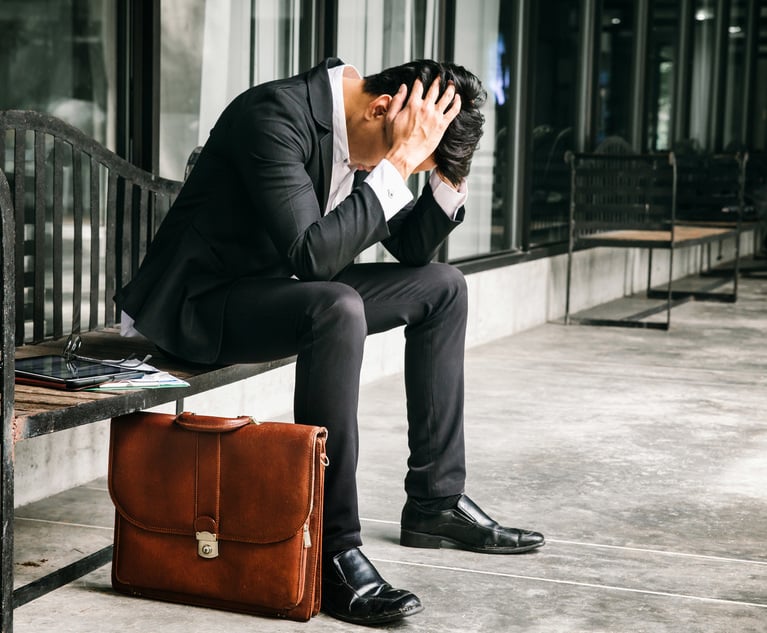Does AI Have a Place in the Courts? Here's How Experts Weigh the Risks and Benefits
On the one hand is improved efficiency and access to justice. On the other, threats to due process and transparency. A conversation in Silicon Valley last week at the US-China AI Tech Summit dissected the pros and cons of introducing AI into the judicial process.
July 02, 2018 at 06:54 PM
2 minute read
 Credit: Zapp2Photo/Shutterstock.com arguing cases in court artificial intelligence changing justice "China and the U.S., we share similar challenges ... especially for the transformation issues and [ensuring] fairness, and human dignit y," said Jiyu Zhang, an associate professor, IP Academy at Renmin University of China. Supreme People's Court e always say justice delayed is justice denied," Zhang said. "People see [that] using artificial intelligence technology will [help] promote efficiency." e think a lot about the fundamental impact of AI ... on some real fundamental concepts underlying the law and a society founded upon the rule of law," Philips said. "Certainly [we're] thinking very carefully about what the impact [of] these systems might be on due process, equality under the law." Covington & Burling Loomis v. Wisconsin. The key takeaway from the U.S. perspective is, as technology continues to advance and move forward, it's important for [the AI] community as a whole to say, what are the legal issues impacted by AI, [including] security liability, and come up with [a] sense of the rules and guidelines that properly balance all of them," Tiedrich said.
Credit: Zapp2Photo/Shutterstock.com arguing cases in court artificial intelligence changing justice "China and the U.S., we share similar challenges ... especially for the transformation issues and [ensuring] fairness, and human dignit y," said Jiyu Zhang, an associate professor, IP Academy at Renmin University of China. Supreme People's Court e always say justice delayed is justice denied," Zhang said. "People see [that] using artificial intelligence technology will [help] promote efficiency." e think a lot about the fundamental impact of AI ... on some real fundamental concepts underlying the law and a society founded upon the rule of law," Philips said. "Certainly [we're] thinking very carefully about what the impact [of] these systems might be on due process, equality under the law." Covington & Burling Loomis v. Wisconsin. The key takeaway from the U.S. perspective is, as technology continues to advance and move forward, it's important for [the AI] community as a whole to say, what are the legal issues impacted by AI, [including] security liability, and come up with [a] sense of the rules and guidelines that properly balance all of them," Tiedrich said.
This content has been archived. It is available through our partners, LexisNexis® and Bloomberg Law.
To view this content, please continue to their sites.
Not a Lexis Subscriber?
Subscribe Now
Not a Bloomberg Law Subscriber?
Subscribe Now
NOT FOR REPRINT
© 2024 ALM Global, LLC, All Rights Reserved. Request academic re-use from www.copyright.com. All other uses, submit a request to [email protected]. For more information visit Asset & Logo Licensing.
You Might Like
View All
Polsinelli Hires Data Privacy, Tech Transactions Partner From Kirkland & Ellis

Many Lawyers Are Reeling From Election Results, but Leaders Are Staying Mum
6 minute read
Quantum Computing Company to Part With General Counsel

California-Based Portal Crypto Exchange Faces Delaware Investor Class Action
3 minute readTrending Stories
- 1Law Firm Accused of Barratry for Allegedly Soliciting Crash Victims
- 2Carlton Fields Downsizes in Move to New Atlanta Office
- 3Trump's Selection of Zeldin to Head EPA Draws Surprise, Little Hope of Avoiding Deregulation
- 4Against the Odds: Voters Elect Woody Clermont to the Broward Judicial Bench
- 5US Supreme Court Justices Pass on Landlord Challenge to NY Rent Stabilization
Who Got The Work
Michael G. Bongiorno, Andrew Scott Dulberg and Elizabeth E. Driscoll from Wilmer Cutler Pickering Hale and Dorr have stepped in to represent Symbotic Inc., an A.I.-enabled technology platform that focuses on increasing supply chain efficiency, and other defendants in a pending shareholder derivative lawsuit. The case, filed Oct. 2 in Massachusetts District Court by the Brown Law Firm on behalf of Stephen Austen, accuses certain officers and directors of misleading investors in regard to Symbotic's potential for margin growth by failing to disclose that the company was not equipped to timely deploy its systems or manage expenses through project delays. The case, assigned to U.S. District Judge Nathaniel M. Gorton, is 1:24-cv-12522, Austen v. Cohen et al.
Who Got The Work
Edmund Polubinski and Marie Killmond of Davis Polk & Wardwell have entered appearances for data platform software development company MongoDB and other defendants in a pending shareholder derivative lawsuit. The action, filed Oct. 7 in New York Southern District Court by the Brown Law Firm, accuses the company's directors and/or officers of falsely expressing confidence in the company’s restructuring of its sales incentive plan and downplaying the severity of decreases in its upfront commitments. The case is 1:24-cv-07594, Roy v. Ittycheria et al.
Who Got The Work
Amy O. Bruchs and Kurt F. Ellison of Michael Best & Friedrich have entered appearances for Epic Systems Corp. in a pending employment discrimination lawsuit. The suit was filed Sept. 7 in Wisconsin Western District Court by Levine Eisberner LLC and Siri & Glimstad on behalf of a project manager who claims that he was wrongfully terminated after applying for a religious exemption to the defendant's COVID-19 vaccine mandate. The case, assigned to U.S. Magistrate Judge Anita Marie Boor, is 3:24-cv-00630, Secker, Nathan v. Epic Systems Corporation.
Who Got The Work
David X. Sullivan, Thomas J. Finn and Gregory A. Hall from McCarter & English have entered appearances for Sunrun Installation Services in a pending civil rights lawsuit. The complaint was filed Sept. 4 in Connecticut District Court by attorney Robert M. Berke on behalf of former employee George Edward Steins, who was arrested and charged with employing an unregistered home improvement salesperson. The complaint alleges that had Sunrun informed the Connecticut Department of Consumer Protection that the plaintiff's employment had ended in 2017 and that he no longer held Sunrun's home improvement contractor license, he would not have been hit with charges, which were dismissed in May 2024. The case, assigned to U.S. District Judge Jeffrey A. Meyer, is 3:24-cv-01423, Steins v. Sunrun, Inc. et al.
Who Got The Work
Greenberg Traurig shareholder Joshua L. Raskin has entered an appearance for boohoo.com UK Ltd. in a pending patent infringement lawsuit. The suit, filed Sept. 3 in Texas Eastern District Court by Rozier Hardt McDonough on behalf of Alto Dynamics, asserts five patents related to an online shopping platform. The case, assigned to U.S. District Judge Rodney Gilstrap, is 2:24-cv-00719, Alto Dynamics, LLC v. boohoo.com UK Limited.
Featured Firms
Law Offices of Gary Martin Hays & Associates, P.C.
(470) 294-1674
Law Offices of Mark E. Salomone
(857) 444-6468
Smith & Hassler
(713) 739-1250






